The fascists of the Olympic Games. How did the fate of Hitler's favorite champions?
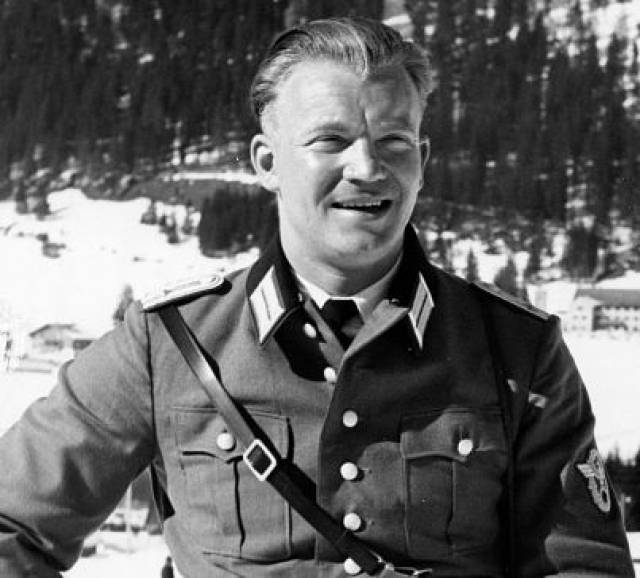
The reasons for the brutal revenge are clear. The deceased captain Hans Wölke was no ordinary police officer. The famous German athlete, shot putter Hans Wölke won the gold medal at the Olympic Games in Berlin in 1936. The athlete served in the Berlin police, and the victory at the games contributed to its rapid progress. Wolka was personally introduced to Adolf Hitler, and the leadership produced a non-commissioned officer as a police lieutenant. With the start of the war, the 30-year-old Olympian police officer was transferred to the security police and sent to the front. Who knew that the winner of the Olympic Games was destined to die in Belarus, and his death would provoke a war crime in Khatyn. For the death of their Olympic champion, the Nazis took revenge by killing 149 civilians from Khatyn. Wielka was posthumously awarded the rank of police major.
Among the nazi servicemen and punishers Wolka was not the only "Olympian". History World War II knows many examples of the participation of renowned athletes in the fighting. Many German Olympians with the beginning of the war were at the front. 17 July 1941, less than a month after the attack on the Soviet Union, Ludwig Stubbendorf (1906-1941) died on the eastern front - 1936 Olympian champion in equestrian sport, who served as commander in an artillery regiment. In 1944, on the eastern front, Kurt Hasse died - the general’s son, a cavalry officer, who won gold in 1936 in the year as a champion in long jump.
The fact that the Olympians went to war was not surprising. The heroes of the Berlin Olympics 1936, at the time of the outbreak of World War II, were full of young men, most of whom already served in the German security forces - the army or the police. In addition, the presence of legends of big sports in the current army, in the opinion of the command, should have had an encouraging influence on the personnel of the Nazi troops. By the way, some of the Olympians were lucky. They survived and returned from the fronts of World War II. For example, Alfred Schwartzman is a three-time champion of the Berlin Olympic Games 1936.
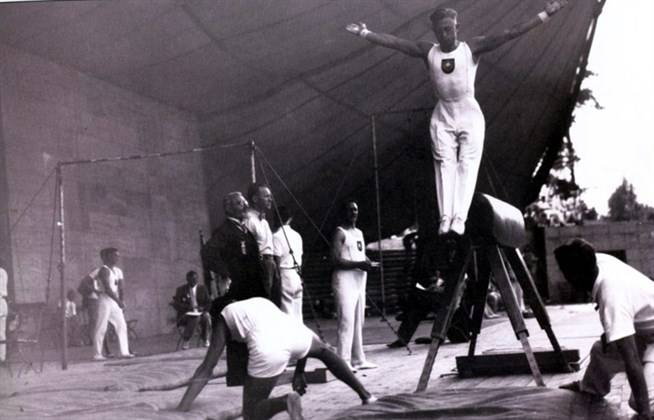
Still 1 April 1935, 23-year-old Alfred Schwartzman joined the German army by signing an 12-year contract. But he failed to serve in the Wehrmacht 12 for years - after a decade, Hitlerite Germany collapsed, unable to endure the anti-Hitler coalition in a mortal battle with the Soviet Union. At the Berlin Olympics, Schwartzman received a “gold” three times as part of the German gymnastics team and in the single jump. In the 1939 year, being a famous German sportsman, Schwartzman transferred to the airborne troops. Then it was a new kind of military, so it is not surprising that the athlete - Olympian, who was in excellent physical shape, decided to serve in the Airborne Forces, was not.
10 May 1940, the parachute division, which served as Chief Lieutenant Schwartzman, landed on the Dutch coast. A fierce battle began with the Dutch troops, during which Schwartzman was seriously wounded in the lung. A bleeding German officer was discovered by a Dutch patrol in the vicinity of Dordrecht. The Dutch were about to shoot the Nazis so that he would not suffer, when suddenly Simon Hayden, one of the Dutch soldiers, recognized the Olympic champion in a wounded German. So Schwartzman was still alive. Soon Holland fell, and Schwartzman himself, having corrected his health and having received the Knight's Cross of the Iron Cross, went on to fight.
Despite the fact that he served in combat units, he was fortunate enough to go through the whole war alive. Schwartzman fought on Crete, then in 1941-1942. served on the Eastern Front, where he received the rank of captain. 15 March 1943, he became the Chief of Staff of the 7 Air Division, then the 1 Parachute Division. 20 April 1945, Schwartzman was promoted to Major, and already 9 May 1945 was captured by British troops. From the major prisoner of war camp, 29 was released on October 1945 of the year. He continued his sports career and in 1952, already at 40, he achieved a silver medal at the Helsinki Olympics. Schwartzman lived a long life, having died in 2000, at the age of 87.
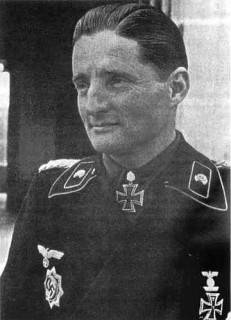 Hermann von Oppeln-Bronikowski, an aristocrat and cavalry officer, was already an 1936-year-old officer by the time of the Berlin 37 Olympiad. He began serving as a lieutenant as early as 1917, and received two Iron crosses during World War I, although he did not participate in the battles directly. At the Olympics, he received "gold" in the German equestrian sport team. By the time World War II began, 42-year-old Major von Oppeln-Bronikowski was in command of a cavalry squadron. He was transferred by the commander of the reconnaissance battalion to the 24 Infantry Division, in which von Oppeln-Bronikovsky participated in the war with Poland. Perhaps he managed to make the most significant military career, among other German Olympians. In April, 1940, von Oppeln-Bronikovsky, was transferred to the Army headquarters, and in August he was promoted to lieutenant colonel. 15 January 1942, he became the commander of the 11-th tank regiment of the 6-th motorized division of the Wehrmacht, receiving in February the rank of colonel.
Hermann von Oppeln-Bronikowski, an aristocrat and cavalry officer, was already an 1936-year-old officer by the time of the Berlin 37 Olympiad. He began serving as a lieutenant as early as 1917, and received two Iron crosses during World War I, although he did not participate in the battles directly. At the Olympics, he received "gold" in the German equestrian sport team. By the time World War II began, 42-year-old Major von Oppeln-Bronikowski was in command of a cavalry squadron. He was transferred by the commander of the reconnaissance battalion to the 24 Infantry Division, in which von Oppeln-Bronikovsky participated in the war with Poland. Perhaps he managed to make the most significant military career, among other German Olympians. In April, 1940, von Oppeln-Bronikovsky, was transferred to the Army headquarters, and in August he was promoted to lieutenant colonel. 15 January 1942, he became the commander of the 11-th tank regiment of the 6-th motorized division of the Wehrmacht, receiving in February the rank of colonel. Tank The von Oppeln-Bronikowski regiment fought on the eastern front, where the colonel was slightly injured. After the colonel came under the erroneous raid of the German aviation and was seriously wounded, he was transferred to the officer reserve. Von Oppeln-Bronikowski returned to the front only in June 1944, and to the west. He commanded a tank regiment in France, but part of von Oppeln-Bronikowski suffered a severe defeat in the Caen region. In November 1944, the colonel was transferred to the Eastern Front as the commander of the 20th Panzer Division, and on January 30, 1945 he was awarded the rank of Major General. The division commanded by the Olympian retreated from East Prussia to Poland and then to Germany. After the defeat of Nazi Germany, von Oppeln-Bronikowski headed west, where he surrendered to the command of American troops. The Olympic General was lucky - he remained at large, and after the creation of the Federal Republic of Germany he took an active part in the formation and preparation of the Bundeswehr as a civilian adviser.
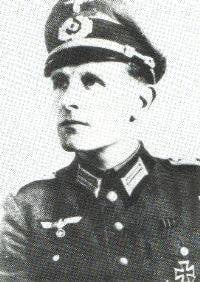
However, another German Olympian - Heinz Brandt - also managed to rise to the rank of major general, although the title was awarded posthumously. Heinz Brandt, like von Oppeln-Bronikowski, began his service in cavalry. He served in the 2 Cavalry Regiment, and at the Berlin Olympic Games 1936, he was sent as a member of the equestrian sport team and received a “gold” for the team championship in show jumping, playing the Alchemist on horseback. In October, 1940, he was transferred to the General Staff, and then - to the staff officer of the operational management of the General Staff in the 297-th Infantry Division. In 1941, Brandt was promoted to major, 1942 a lieutenant colonel, and 1943 a colonel.
The death of Heinz Brandt was due to a severe injury. Brandt was the victim of a failed assassination attempt by army officials on Hitler's Fuhrer 20 July 1944. Wanting to get closer to the map, Colonel Heinz Brandt accidentally kicked a briefcase with a bomb left by Colonel Klaus von Stauffenberg at the table where Adolf Hitler was. After that, Brandt rearranged the briefcase on the other side of the table. With a thundering explosion, Heinz Brandt tore off his leg. The officer was taken to a military hospital, but on July 21 he died. Hitler posthumously awarded the colonel, who saved him (albeit unknowingly) life, the rank of major general.
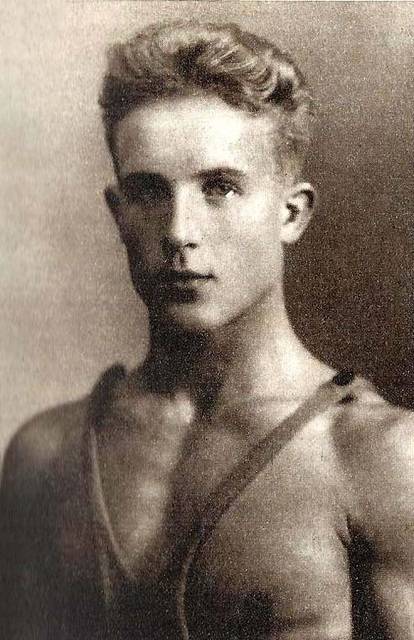
Not spared the war and Olympic champions from the Allied Hitlerite Germany states. So, in 1944, near Vyborg, the corporal of the Finnish army Lauri Koskela died. Wrestler, repeated champion of Europe and Finland in lightweight, Lauri Koskela won the Olympic Games in his weight category in 1936 year. He was in military service after the start of the Soviet-Finnish war, then, after the start of the Great Patriotic War, he was again mobilized, but soon he was released from military service by age. Nevertheless, the deterioration of the situation on the front and the offensive of the Soviet troops forced Finland to mobilize reservists to 1944. Corporal Lauri Koskela was among the conscripts. 3 August 1944, the Olympic champion was with his colleagues in a trench near the village of Baryshevo. He was just reading a letter from a loved one, when a gust of wind tore the letter out of his hands. The corporal Koskela, who had pulled after him, appeared over the trench and at the same moment was hit by a bullet of a Soviet sniper. So on the 38 year of life, one of the most famous Finnish fighters of that time died.
4 year-old Japanese Shigeo Arai became the Olympic champion in swimming in the 200 × 1936 relay freestyle, setting a world record at the Berlin 20 Olympic Games of the year.
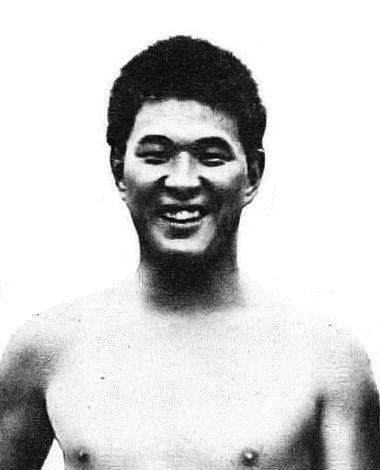 University student Rikke managed not only to become a record holder in the relay, but also to get bronze at the 100 distance in freestyle. Like many other athletes of his generation, with the start of the war of Japan and its allies, Shigeo Arai was drafted into the army. He served for three years, and on July 19, 1944 of the year died in Burma, where Japanese troops fought bitterly with the British army.
University student Rikke managed not only to become a record holder in the relay, but also to get bronze at the 100 distance in freestyle. Like many other athletes of his generation, with the start of the war of Japan and its allies, Shigeo Arai was drafted into the army. He served for three years, and on July 19, 1944 of the year died in Burma, where Japanese troops fought bitterly with the British army. When the American Earl Meadows became the champion in pole vault at the 1936 Olympiad of the Year, two Japanese athletes, Xohai Nishida and Sueo Oe, were to compete in second place. But the Japanese refused to fight each other, after which a silver medal was drawn by lot, and Oe a bronze medal. With the beginning of the war, Kayo University graduate Sueo Oe was drafted into the army and died at the very beginning of the fighting in the Pacific - at the end of December 1941 on the Philippine island of Luzon. He was only 27 years old.
Among men, Hungarian Ferenc Chick became the champion in 100 swimming at the Berlin Olympics. He studied in Budapest as a doctor, at the same time doing swimming, and was able to succeed very much in this sport. In October, 1944, Ferenc Chika was called up for military service. By this time, Hungary’s horticulture was already experiencing a huge shortage of human resources, so the appeal did not bypass the Olympic champion. Ferenc Chick, as a person with a higher medical education, became a military doctor. He died 29 March 1945 of the year during aerial bombardment at the age of 31 of the year.
The Hungarian aristocrat Jozsef von Platti, the Olympic medalist, was more fortunate in life than in competition. A graduate of the military academy "Louis", von Platti, from 1924, was actively involved in equestrian sports - he was obliged to this by the status of an officer, and his aristocratic background. Although at the 1936 games of the year he received only bronze in equestrian sports, von Platti was able to survive at the front. In 1944, he received the rank of lieutenant colonel, and when the affairs of the Hungarian army became very bad, he got to the location of the British troops and surrendered to the British.
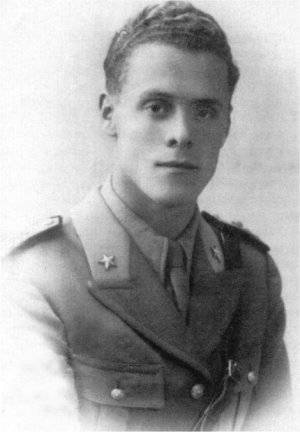 Already in the fall of 1946, he returned to Hungary.
Already in the fall of 1946, he returned to Hungary. 24 August 1942 Italian units attacked the Izbuschensky farm in the Stalingrad region. Captain Silvano Abba (in the photo), a renowned athlete and professional military, was killed in the battle. A graduate of the Military Academy in Modena, Silvano Abba was engaged in a very popular sport among officers - the pentathlon (dressage, shooting, swimming, running, fencing). At the 1936 Olympics, he won a bronze medal in the pentathlon. After the outbreak of the Spanish Civil War, Abba volunteered to fight for Francisco Franco, and when Germany and her satellites attacked the Soviet Union, Abba, who served as captain in the 3 Savoy Cavalry Regiment, was sent to the eastern front. He died in the 31 year along with 31 as his fellow officer in the Savoy Regiment.
The fate of the "Olympic fascists" is a confirmation of how big sport becomes an instrument of political propaganda in the hands of the government. Actually, otherwise the life of young athletes, most of them military, in those years could not take shape.
Information